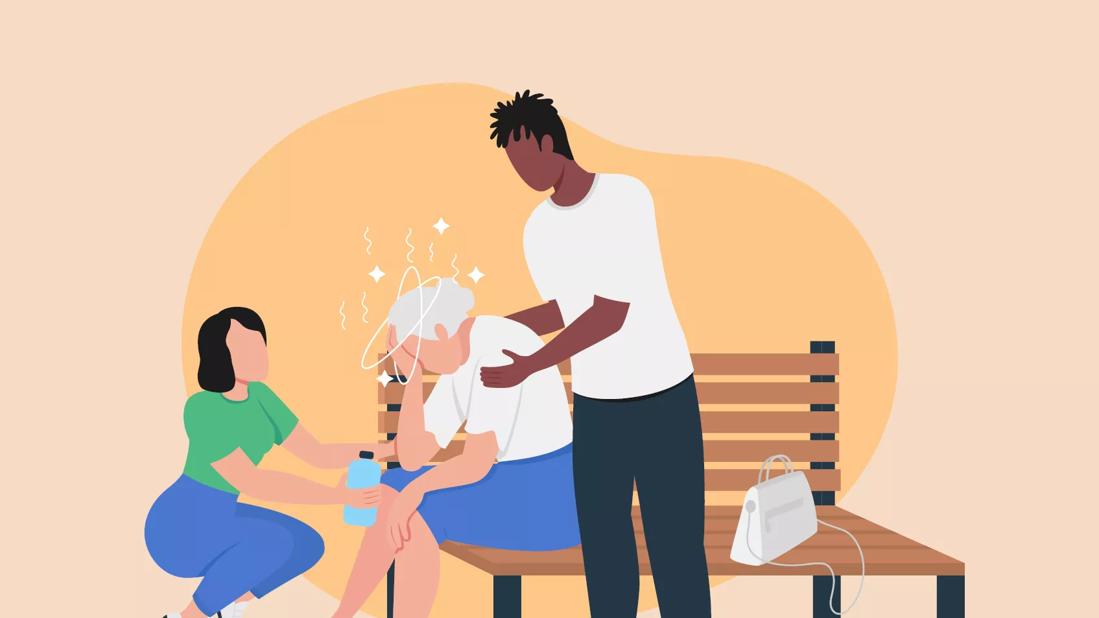An allergist explains this uncommon but unsettling symptom

Image content: This image is available to view online.
View image online (https://assets.clevelandclinic.org/transform/534acc4a-bbe3-4a17-aaed-c8a0660864c0/SeasonalAllergiesAndDizziness-1321090333-770x533-1_jpg)
Two people help a third person who is feeling dizzy
If you feel like your allergies spin you “right ’round, baby, right ‘round” … well, you’re not wrong. This is a relatively rare symptom, but it’s possible.
Advertisement
Cleveland Clinic is a non-profit academic medical center. Advertising on our site helps support our mission. We do not endorse non-Cleveland Clinic products or services. Policy
You’re probably already familiar with standard allergy symptoms: runny nose, itchy eyes, sneezing and the like. But you might not realize that issues like dizziness (feeling off-balance) and vertigo (feeling like you’re spinning) can be a direct result of your allergies, too.
“I’d estimate that maybe 5% of my patients are specifically referred for these reasons,” says allergist Mark Aronica, MD. He explains what causes allergy-induced dizziness and what to do if it’s happening to you.
Your Eustachian tubes are tiny tubes that connect your ears to your sinuses. They drain fluid and equalize the air pressure inside of your ears, which contributes to your sense of balance. They also lead to your vestibular system, located in your inner ear, which is responsible for sending your brain signals about balance.
It makes sense, then, that if your Eustachian tubes are swollen or blocked, you may start experiencing dizziness or vertigo. And what can cause your Eustachian tubes to become swollen or blocked? You guessed it: allergies.
Inflammation and mucus build-up in your Eustachian tubes is called Eustachian tube dysfunction. And though it doesn’t always cause dizziness or vertigo, they can be among the symptoms.
Advertisement
“When you have inflammation in the nose and sinuses, you can also have inflammation in and around the Eustachian tubes, which can cause those tubes to narrow,” Dr. Aronica explains. “Fluid can then build up behind the ear and impact the vestibular system, which can cause dizziness.”
The best way to treat allergy-induced dizziness is to treat your allergies themselves. Whether you have spring allergies or fall allergies (or year-round allergies, ugh), management looks pretty similar: Avoid allergens, if you can, and turn to medication if you can’t.
“When I see patients with dizziness, we try a nasal steroid spray to see if that reduces inflammation and opens up the Eustachian tubes,” Dr. Aronica says. “If their dizziness gets better, that suggests cause and effect.”
Prescription nasal steroid sprays like fluticasone and triamcinolone can ease the inflammation in your nose, sinuses and Eustachian tubes.
You can also ease your allergies with over-the-counter medications and prevent your symptoms from getting worse by keeping outdoor allergens out of your home. Keep your windows closed, bathe outdoor pets frequently and wash your clothes after you’ve spent time outdoors, especially if you’re doing something allergy-inducing, like hiking, raking leaves or mowing the lawn.
“If a steroid nasal spray doesn’t work, I encourage patients to follow up appropriately with their primary care physician or the doctor who referred them — just to make sure we’re not missing something else,” Dr. Aronica notes.
A number of other conditions can cause dizziness and vertigo, so if your allergies aren’t the culprit, you may need to see a neurologist or an otolaryngologist (an ear, nose and throat doctor, commonly known as an ENT) to figure out what’s going on.
If you’re experiencing frequent dizziness or vertigo, you should make an appointment to get checked out — and if you know you’re also in the midst of a bout of bad allergies, be sure to tell your doctor so they can best assess the cause of your symptoms.
To learn more about allergies from Dr. Aronica, listen to the Health Essentials Podcast episode, “Dealing with Spring and Summer Allergies.” New episodes of the Health Essentials Podcast publish every Wednesday.
Advertisement

Delivered every Tuesday!
Sign up for our Health Essentials emails for expert guidance on nutrition, fitness, sleep, skin care and more
Learn more about our editorial process.
Advertisement
Infections like sinusitis, colds, flu and COVID-19 can cause a fever, but allergies aren’t infections
Reduce the impact of seasonal sniffles by starting your medications ahead of time
It can help reduce exposure to allergens, but don't expect it to solve allergy or asthma issues
Allergies can pop up at any time in your life
A natural approach may help resolve that sneezing and runny nose
Foods like hot peppers, garlic and ginger can trigger a leaky reaction
Find out if the perfect pooch truly exists from an allergist
Surprisingly simple bedroom changes that work
Type 2 diabetes isn’t inevitable with these dietary changes
Applying a hot or cold compress can help with pain
Pump up your iron intake with foods like tuna, tofu and turkey